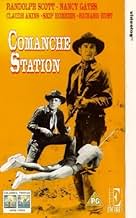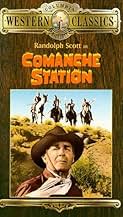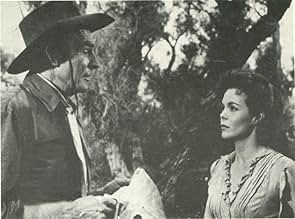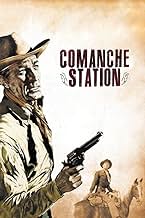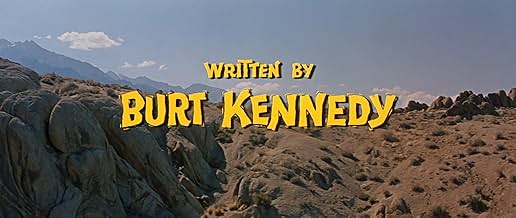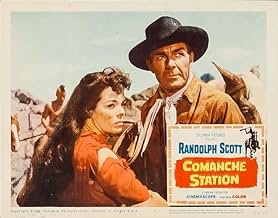CALIFICACIÓN DE IMDb
7.0/10
4.7 k
TU CALIFICACIÓN
Un hombre salva a una mujer que había sido secuestrada por los comanches, y luego lucha por llevar a ambos a casa con vida.Un hombre salva a una mujer que había sido secuestrada por los comanches, y luego lucha por llevar a ambos a casa con vida.Un hombre salva a una mujer que había sido secuestrada por los comanches, y luego lucha por llevar a ambos a casa con vida.
- Dirección
- Guionista
- Elenco
- Dirección
- Guionista
- Todo el elenco y el equipo
- Producción, taquilla y más en IMDbPro
Opiniones destacadas
While the western genre is not my favourite one of all film genres (not sure which one is my favourite due to trying to appreciate them all the same), there is a lot of appreciation for it by me. There are a lot of very good to great films, with the best work of John Ford being notable examples.
'Comanche Station' is the final collaboration of the seven films director Budd Boetticher and lead actor Randolph Scott did together in the late 50s. By all means 'Comanche Station' is not their best pairing (perhaps towards the lesser end, which is not a knock as this merely means it's only because the best of them are so great), but one can totally see the appeal of their collaborations and both Boetticher and Scott are well served, the film being a good representation of both. It is a very good note to go out on and of their films it is perhaps the most overlooked. Which is a shame because it's a very good film with many excellent elements.
By all means not perfect. Nancy Gates is rather bland in a role that is rather underwritten. The film loses momentum on occasions.
However, Scott is as stoic and charismatic as ever with an appealingly craggy edge, being both likeable and tough. Every bit as good is a truly menacing Claude Akins, relishing his quite meaty villainous character. The two work very effectively together and their final confrontation is one of 'Comanche Station's' high points. Boetticher's direction is efficient and lean.
A big shout has to go to the production values. While there is grandeur and atmosphere to the settings it's the photography that's the star, especially in the unforgettable wordless opening sequence, one of my favourite openings of Boetticher's/Scott's films together. The music is rousing yet never intrusive and the more eventful parts blister.
There is thankfully no fat or ramble to the thought-probing, tight and sharply focused script and the storytelling is brutally bleak and movingly elegiac, mostly nicely paced too. 'Comanche Station' may not have the same depth of characterisation as other Boetticher/Scott outings or character complexity, but the two lead characters are interesting and the character interaction is a major plus point numerous times. Notably with Scott and Akins in their final confrontation, which positively blisters.
On the whole, very good. 8/10 Bethany Cox
'Comanche Station' is the final collaboration of the seven films director Budd Boetticher and lead actor Randolph Scott did together in the late 50s. By all means 'Comanche Station' is not their best pairing (perhaps towards the lesser end, which is not a knock as this merely means it's only because the best of them are so great), but one can totally see the appeal of their collaborations and both Boetticher and Scott are well served, the film being a good representation of both. It is a very good note to go out on and of their films it is perhaps the most overlooked. Which is a shame because it's a very good film with many excellent elements.
By all means not perfect. Nancy Gates is rather bland in a role that is rather underwritten. The film loses momentum on occasions.
However, Scott is as stoic and charismatic as ever with an appealingly craggy edge, being both likeable and tough. Every bit as good is a truly menacing Claude Akins, relishing his quite meaty villainous character. The two work very effectively together and their final confrontation is one of 'Comanche Station's' high points. Boetticher's direction is efficient and lean.
A big shout has to go to the production values. While there is grandeur and atmosphere to the settings it's the photography that's the star, especially in the unforgettable wordless opening sequence, one of my favourite openings of Boetticher's/Scott's films together. The music is rousing yet never intrusive and the more eventful parts blister.
There is thankfully no fat or ramble to the thought-probing, tight and sharply focused script and the storytelling is brutally bleak and movingly elegiac, mostly nicely paced too. 'Comanche Station' may not have the same depth of characterisation as other Boetticher/Scott outings or character complexity, but the two lead characters are interesting and the character interaction is a major plus point numerous times. Notably with Scott and Akins in their final confrontation, which positively blisters.
On the whole, very good. 8/10 Bethany Cox
Comanche Station is the last of several films Randolph Scott made for Budd Boetticher with Columbia pictures. This would have been his last film, but for being lured to do just one more, the immortal Ride the High Country.
The film combines elements of The Naked Spur and Two Rode Together and blends them successfully. Scott is a man with one obsession, to get his wife back from the Comanches who kidnapped here ten years earlier. Whenever he hears of a white woman being put up for trade by the Indians he heads out with trade goods and buys her in the hopes of finding his beloved.
On this trip he ransoms Nancy Gates away from the Comanches. Later on he runs into an old enemy Claude Akins traveling with two young guns, Richard Rust and Skip Homeier. It seems as though Nancy's husband has put up a ten thousand dollar reward for her.
Akins is a truly malevolent figure, a scalphunter who kills Indians and sells their scalps for bounty. Unfortunately the two have need of each other in hostile Indian territory.
Randolph Scott's western heroes usually have an edge to them, they are not pure heroes as Joel McCrea's are. But in this film he's poaching on McCrea's territory in gallantry. His behavior towards Nancy Gates is at all times chivalrous. I wouldn't be surprised if there was a medieval origin to the plot of Comanche Territory.
Had Scott not come back to do Ride the High Country, Comanche Station would have been a good film to go out on.
The film combines elements of The Naked Spur and Two Rode Together and blends them successfully. Scott is a man with one obsession, to get his wife back from the Comanches who kidnapped here ten years earlier. Whenever he hears of a white woman being put up for trade by the Indians he heads out with trade goods and buys her in the hopes of finding his beloved.
On this trip he ransoms Nancy Gates away from the Comanches. Later on he runs into an old enemy Claude Akins traveling with two young guns, Richard Rust and Skip Homeier. It seems as though Nancy's husband has put up a ten thousand dollar reward for her.
Akins is a truly malevolent figure, a scalphunter who kills Indians and sells their scalps for bounty. Unfortunately the two have need of each other in hostile Indian territory.
Randolph Scott's western heroes usually have an edge to them, they are not pure heroes as Joel McCrea's are. But in this film he's poaching on McCrea's territory in gallantry. His behavior towards Nancy Gates is at all times chivalrous. I wouldn't be surprised if there was a medieval origin to the plot of Comanche Territory.
Had Scott not come back to do Ride the High Country, Comanche Station would have been a good film to go out on.
A magazine article recently cited this movie as an underrated western. I certainly agree. Randolph Scott made his best westerns in the latter part of his career, and this is one of those. The movie examines the old west moral code of right v. wrong and raps up with a surprising twist ending that gives cynicism a kick in the rear end. Not a big splashy western, but a solid little one.
The last of the seven Scott/Boetticher collaborations and although it's not one of my favorites {THE TALL T (1957) and RIDE LONESOME (1959) come out ahead}, it's still worth owning on DVD if Columbia/Tristar ever sees fit to release it.
Randolph Scott plays a rancher named Jefferson Cody who's wife was kidnapped by the Comanches a few years before. When he hears that the Comanches are holding a white woman, he goes to them for a trade and winds up with another man's wife named Mrs. Lowe (Nancy Gates).
As they head back, they stop at Comanche Station in order to water their horses and get fresh supplies. When they arrive there, they see three men being chased by a bunch of Comanches on the warpath. Cody recognizes one of them as Ben Lane (Claude Akins), a soldier he had drummed out of the army for an atrocity against the Indians, many years before. He also suspects Lane is trafficking in scalps and that's why the Indians are after them.
They manage to fight them off and when the coast is clear, Lane informs Mrs. Lowe that she has a $5,000 reward put up for her by her husband. Mrs. Lowe then suspects Cody of his intentions but it's apparent from the beginning that Cody isn't interested in any reward money. He just wants to find out what happened to his wife.
Also Lane has a habit of saying "Ha-lo.." every time he's being addressed. A nice script touch put in there by Burt Kennedy who wrote the script. It gives Lane something to distinguish him by.
It now becomes a battle of wills between Cody and Lane with Mrs. Lowe and Lane's two dimwitted sidemen (played by Skip Homeier and Richard Rust) looking on. When Frank (Homeier) is sent up the creek to see if the Comanches have cut off their trail, he comes floating back down, dead with an arrow in his back. And later when Dobie (Rust) has a change of heart and wants to throw in with Cody, he gets shot in the back by Lane for his efforts.
That shot warns Cody that Lane is nearby and the inevitable showdown takes place in the Lone Pine rocks. We all know who wins that one, right? Cody finally brings Mrs. Lowe back to her husband only to learn that he is blind and really doesn't care what's happened to her. He just wants her back.
Beautiful widescreen print that was remastered in the late 1990s, this one would be a welcome addition to any western library. It needs a DVD release.
7 out of 10
Randolph Scott plays a rancher named Jefferson Cody who's wife was kidnapped by the Comanches a few years before. When he hears that the Comanches are holding a white woman, he goes to them for a trade and winds up with another man's wife named Mrs. Lowe (Nancy Gates).
As they head back, they stop at Comanche Station in order to water their horses and get fresh supplies. When they arrive there, they see three men being chased by a bunch of Comanches on the warpath. Cody recognizes one of them as Ben Lane (Claude Akins), a soldier he had drummed out of the army for an atrocity against the Indians, many years before. He also suspects Lane is trafficking in scalps and that's why the Indians are after them.
They manage to fight them off and when the coast is clear, Lane informs Mrs. Lowe that she has a $5,000 reward put up for her by her husband. Mrs. Lowe then suspects Cody of his intentions but it's apparent from the beginning that Cody isn't interested in any reward money. He just wants to find out what happened to his wife.
Also Lane has a habit of saying "Ha-lo.." every time he's being addressed. A nice script touch put in there by Burt Kennedy who wrote the script. It gives Lane something to distinguish him by.
It now becomes a battle of wills between Cody and Lane with Mrs. Lowe and Lane's two dimwitted sidemen (played by Skip Homeier and Richard Rust) looking on. When Frank (Homeier) is sent up the creek to see if the Comanches have cut off their trail, he comes floating back down, dead with an arrow in his back. And later when Dobie (Rust) has a change of heart and wants to throw in with Cody, he gets shot in the back by Lane for his efforts.
That shot warns Cody that Lane is nearby and the inevitable showdown takes place in the Lone Pine rocks. We all know who wins that one, right? Cody finally brings Mrs. Lowe back to her husband only to learn that he is blind and really doesn't care what's happened to her. He just wants her back.
Beautiful widescreen print that was remastered in the late 1990s, this one would be a welcome addition to any western library. It needs a DVD release.
7 out of 10
This is the final film that was directed by Budd Boetticher and starring Randolph Scott. Like their previous collaborations, they both work together to produce Westerns that manage to rise above the mediocre norm. In this film, a fairly typical plot idea is executed very well--with a grace and style that make the film well worth seeing.
Randolph Scott, as usual, plays a nice but tough guy. He's brave enough to come into a Comanche stronghold in order to negotiate for the release of a White woman kidnapped by the tribe. However, trouble is in store when three drifters come upon Scott and the woman. It seems that the leader of this group (Claude Akins) is a real rogue and plans with his men to kill Scott and the woman. It seems that the woman's husband has offered a reward for her--and it can be collected dead or alive! So what did I like about the film? First, as usual, Randolph Scott is amazing. He plays the perfect cowboy hero--tough, slow to speak and anger but also a decent man through and through. Plus, he's much more believable than the bigger than life characters John Wayne usually played. I loved Wayne's films, but he was always too tough and too in command. Scott is much more like a very capable 'everyman' character. Second, as usual, Boetticher deliberately underplays the action--producing a muted but also quite believable film. Third, the film had a really nice ending--quite the twist.
You can't do a lot better than a Scott/Boetticher western. While this isn't their best, it certainly is quite good.
Randolph Scott, as usual, plays a nice but tough guy. He's brave enough to come into a Comanche stronghold in order to negotiate for the release of a White woman kidnapped by the tribe. However, trouble is in store when three drifters come upon Scott and the woman. It seems that the leader of this group (Claude Akins) is a real rogue and plans with his men to kill Scott and the woman. It seems that the woman's husband has offered a reward for her--and it can be collected dead or alive! So what did I like about the film? First, as usual, Randolph Scott is amazing. He plays the perfect cowboy hero--tough, slow to speak and anger but also a decent man through and through. Plus, he's much more believable than the bigger than life characters John Wayne usually played. I loved Wayne's films, but he was always too tough and too in command. Scott is much more like a very capable 'everyman' character. Second, as usual, Boetticher deliberately underplays the action--producing a muted but also quite believable film. Third, the film had a really nice ending--quite the twist.
You can't do a lot better than a Scott/Boetticher western. While this isn't their best, it certainly is quite good.
¿Sabías que…?
- TriviaLast of the "Ranown Westerns", produced by Randolph Scott and his partner Harry Joe Brown under the Ranown Pictures banner. Scott decided to retire after this one, but two years later he was talked out of retirement by Sam Peckinpah for Pistoleros al atardecer (1962). After that film, Scott retired for good.
- ErroresDuring the final shootout with Claude Akins, Randolph Scott and Nancy Gates run and hide in a small rock cave in the hills. As they look out of the cave, a crew member in a blue shirt stands in the path in front of them. When Randolph Scott leaves the cave, he runs right past this crew member.
- ConexionesFeatured in The Guardian Interview with Budd Boetticher (1994)
Selecciones populares
Inicia sesión para calificar y agrega a la lista de videos para obtener recomendaciones personalizadas
- How long is Comanche Station?Con tecnología de Alexa
Detalles
- Fecha de lanzamiento
- País de origen
- Idiomas
- También se conoce como
- Comanche Station
- Locaciones de filmación
- Productora
- Ver más créditos de la compañía en IMDbPro
- Tiempo de ejecución1 hora 13 minutos
- Relación de aspecto
- 2.35 : 1
Contribuir a esta página
Sugiere una edición o agrega el contenido que falta

Principales brechas de datos
By what name was Estación comanche (1960) officially released in India in English?
Responda

